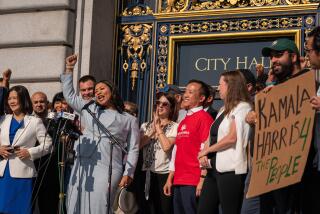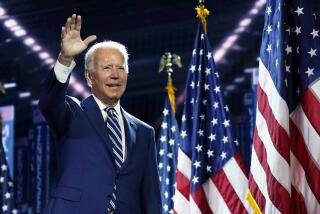Analysis: As Democratic Party activists reject Sen. Feinstein, which side of the debate is more in touch with voters?
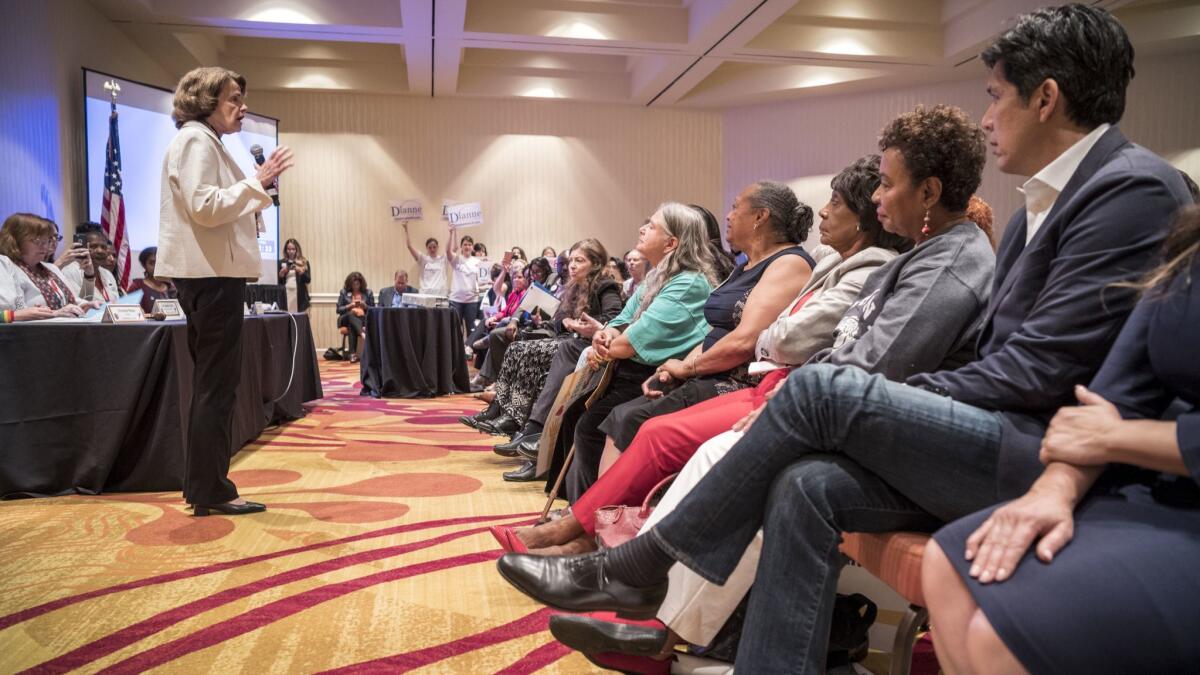
- Share via
Reporting from Oakland — Infused with energetic Bernie Sanders supporters and a generation of Democrats who came to age during the Obama administration, the liberal activists who stock the California Democratic Party’s executive committee want leaders in Washington to take a blowtorch to the policies of President Trump and the Republican-led Congress.
Unsurprisingly, they don’t see Sen. Dianne Feinstein, criticized for preaching “patience” with Trump just a year ago, fitting that bill.
Saturday, they sent their message clearly by endorsing Kevin de León, a liberal firebrand and former state Senate leader from Los Angeles, who has courted progressives in his long-shot bid to defeat Feinstein, a fellow Democrat running for reelection for the fifth time.
The question for the state’s politics is which side of that debate is more in touch with the state’s voters — the activists who are urgently pushing the Democrats to the left or the longtime senator, who trounced De León in the June primary, winning 44% of the overall vote compared with his 12%.
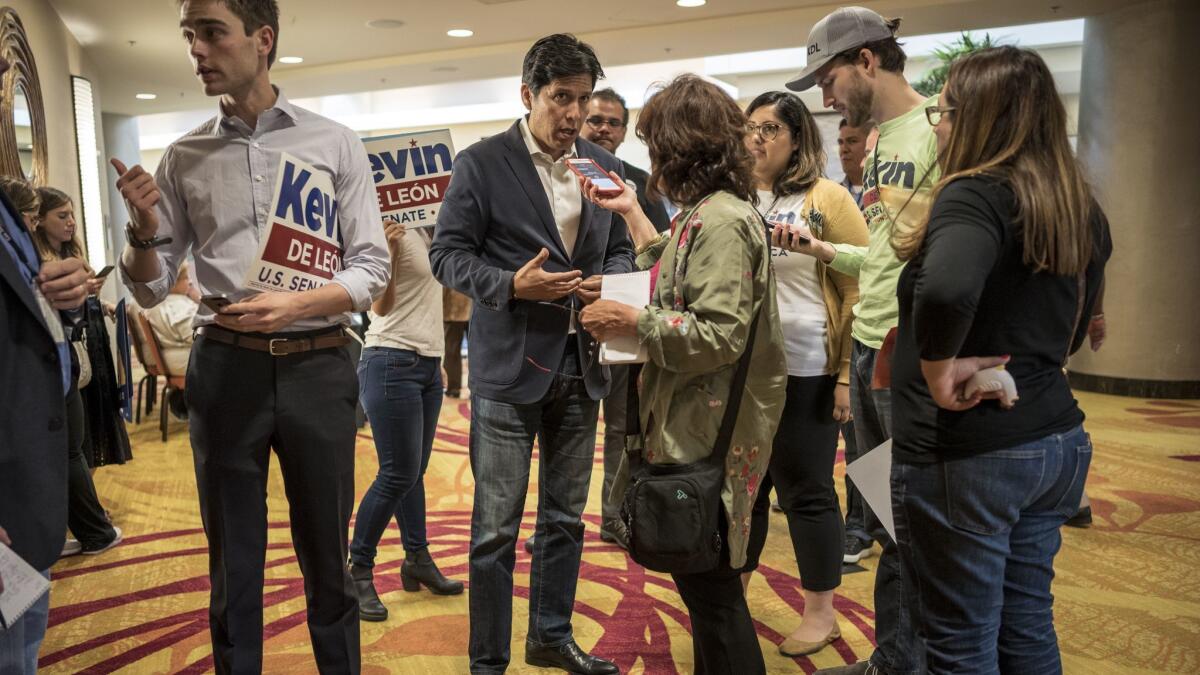
In a state with a tradition of strong political machines, rejection by the party might constitute a fatal blow for an incumbent. In California, where political parties are weak by design, Feinstein remains popular with the overall electorate as well as Democratic voters, probably making the party’s rebuke more of speed bump, political professionals said Sunday.
Feinstein also has banked $7 million, with De León having less than $1 million, according to the latest federal campaign finance reports filed in May.
“I think the endorsement is like a hairline crack in Feinstein’s invincibility,” said Democratic strategist Rose Kapolczynski, who ran the campaigns for former California Sen. Barbara Boxer for two decades. “Whether De León has the credibility and can raise the millions of dollars to make that a real opportunity remains to been seen. I think it’s unlikely with four months to go to the election.”
State party chairman Eric Bauman said the decision was influenced by proximity — De León has been a fixture at state Democratic Party events while Feinstein spends the bulk of her time on the other side of the country because of her job.
“Sen. Feinstein does her work and spends her time 3,000 miles away. Kevin, by nature of his job, is visible and active here at home,” he said.
De León backers said the party vote demonstrates that Feinstein has lost touch with key constituencies.
“She had no relationship with labor. She had no relationship with the Latino community. And considering the role of Latinos and the role of the very progressive union movement, that was always a mystery to us why she didn’t want to have that kind of relationship,” said Maria Elena Durazo, a powerful former labor leader and vice chair of the DNC, who is running for De León’s state Senate seat and has endorsed him.
“It’s shameful she doesn’t have those relationships,” Durazo said.
By contrast with Feinstein, De León has successfully courted support from California’s most politically influential labor organization, including the Service Employees International Union, the California Nurses Assn. and the California Labor Federation.
Others, however, said it’s the party apparatus that has moved away from the center of the electorate.
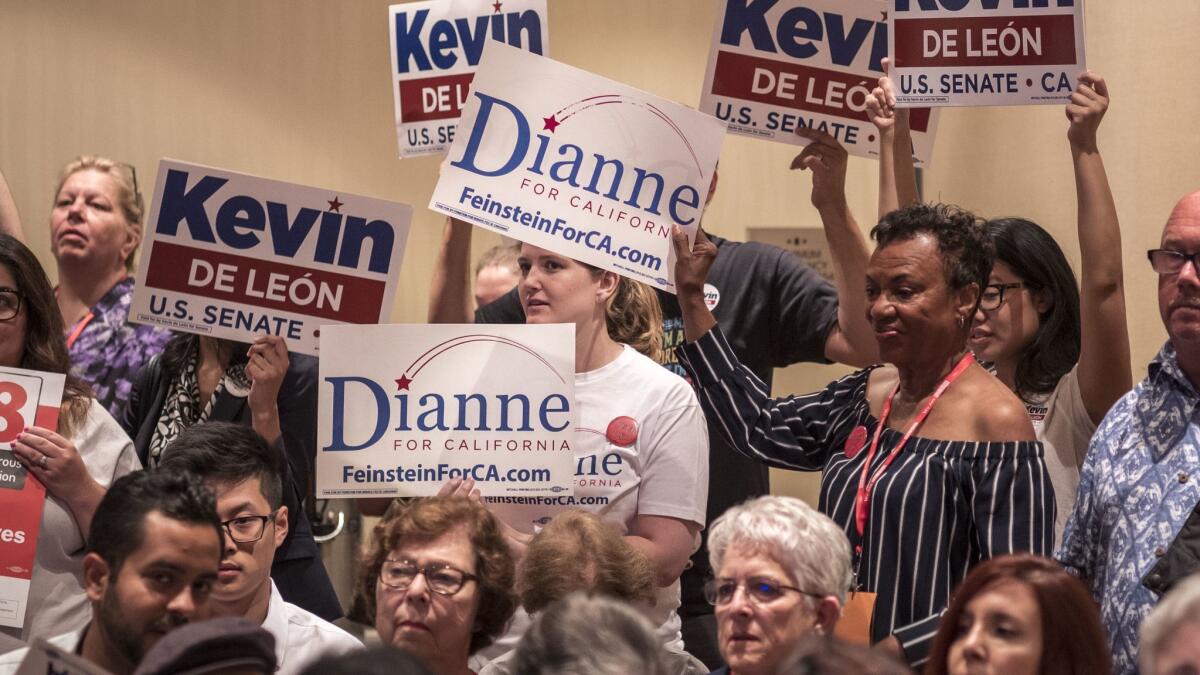
Republican consultant Mike Madrid, who has worked across party lines, said the stark difference between the vote of the state Democratic leadership and the results of the primary illustrate the gap between the party and the voters whose support it needs to hold. A parallel problem faces the state Republican Party, which has veered to the partisan extreme especially in the Trump era, he said.
“These are not mainstream Democrats,” Madrid said. “Both parties have changed, not just in California but nationally. The activists have gotten more and more out of touch.”
The Senate endorsement was decided by the small contingent of Democratic activists who make up the state party’s executive committee — 333 Democratic delegates representing a party with 8.4 million registered voters statewide.
De León won 65% of the delegate votes cast Saturday morning, exceeding the 60% needed to win the endorsement. Feinstein received just 7% of the vote, but that’s somewhat misleading since her campaign urged members to vote in favor of the party withholding an endorsement.
Feinstein is backed by some of California’s most popular Democrats, including Gov. Jerry Brown, Sen. Kamala Harris and Lt. Gov. Gavin Newsom, the front-runner in the 2018 governor’s race.
Feinstein has shown resilience in the past when rebuffed by the state Democratic Party.
When she ran for governor in 1990, Feinstein was booed during her speech before the state Democratic Party convention for restating support for the death penalty. She highlighted the incident in a TV campaign ad as a testament to her independence. Feinstein failed to win the party’s endorsement that year, but did win the primary.
But a lot has changed since then. In the 1990 governor’s race, Republican Pete Wilson beat Feinstein in the general election at a time when GOP voters made up nearly 40% of the electorate. Since 2006, not a single Republican has won a statewide race in California and Republican voter registration has plummeted to 25% of the electorate.
Feinstein has moved left, as well. This year, for example, she revealed that she no longer supports capital punishment.
De León hopes winning the party’s nod will increase his name recognition among California voters, which has been lagging, and hopes to parlay the endorsement into a campaign fundraising jackpot.
He could receive significant help though joint fundraising efforts with the state party. In the 2016 Senate race, the party spent hundreds of thousands of dollars supporting then-Atty. Gen. Kamala Harris in her race against fellow Democrat Rep. Loretta Sanchez of Orange. Harris was the party’s endorsed candidate.
This time around, however, the party and its donors may have higher priorities — notably winning several congressional districts held by Republicans, part of the Democrats’ national drive to retake control of the House.
On Sunday, De León said he’s already overcome his biggest obstacle: surviving the primary. Now anything can happen, and California has two distinct choices.
“Washington has failed us. They counseled patience and passivity, when action is needed,” De León told executive committee members Sunday morning, in a not-too-subtle shot at Feinstein. “I am no liberal-come-lately.”
One of the most telling differences between the two Democrats surfaced in their comments regarding Trump’s nominee to the Supreme Court, Judge Brett M. Kavanaugh. Both warned that another conservative justice would tip the balance on the court and could lead to the end of Roe vs. Wade, the landmark 1973 ruling that guaranteed women nationwide the right to an abortion.
They differed on what approach was needed.
De León, speaking to the party’s women’s caucus, had a blunt proposal, likely to appeal to party activists.
“We need to shut the Senate down,” he said.
Feinstein, during a Saturday morning breakfast she hosted for delegates, offered a less dramatic stand, explaining how the Democrats needed to craft a delicate political strategy to block any threat to abortion rights while protecting Democratic senators from Republican states who could be thrust into political peril over their votes on Kavanaugh’s confirmation, including Sens. Joe Manchin of West Virginia and Claire McCaskill of Missouri.
For party activists, that may seem thin gruel. But voters, overall, may receive a different message: Feinstein is the ranking Democrat on the Senate Judiciary Committee. In the weeks leading up to the November election, it will be she, not De León, in the national spotlight fighting Trump’s nominee.
Complete coverage of California politics »
Updates on California politics
More to Read
Get the L.A. Times Politics newsletter
Deeply reported insights into legislation, politics and policy from Sacramento, Washington and beyond. In your inbox twice per week.
You may occasionally receive promotional content from the Los Angeles Times.

